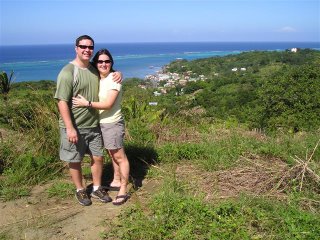.JPG)
During the road trip we all looked forward to our time in Nicaragua. Not only does the country have the reputation for beauty and history it also more recently has been once again on the world stage with the election of Daniel Ortega a socialist with a checkered past. His election sent some shock waves through Central America as investors and Expats alike are worried that he will do damage to the emerging economy and emulate Venezuela's Hugo Chavez with privatization of land and business. Will all of that happen only time will tell but right before our trip we heard that a local oil company was privatized.
When we entered Nicaragua the first thing we saw was a classic socilalist propaganda poster that to me echoed back to all of the communist images I grew up watching on TV as a child.
The message was clear. Arriba, Los Pobres Del Mundo or in english, Rise, The poor of the world. We saw this same image dozens of times all over the country. We also heard a consistent message from the hotel keepers and locals we interacted with that they are none to pleased with how things are going so far.
It will be interesting to see if this political relic can keep power and how far he will go backward with his socialist programs.
If your not familiar with Ortega this little snippet from WIkipedia gives you some of the back story:
José Daniel Ortega Saavedra (born 11 November 1945) is the current President of Nicaragua. For much of his life, he has been an important leader in the Sandinista National Liberation Front (Frente Sandinista de Liberación Nacional or FSLN).
After a popular rebellion resulted in the overthrow and exile of Anastasio Somoza Debayle in 1979, Ortega became a member of the ruling multipartisan junta and was later elected president, serving from 1985 to 1990. His first period in office was characterized by socialist policies, internal dissent, hostility from the United States, and armed rebellion by U.S.-backed Contras.
Ortega was defeated by Violeta Barrios de Chamorro in the 1990 presidential election, but he remained an important figure in Nicaraguan opposition politics. He was an unsuccessful candidate for president in 1996 and 2001 before winning the 2006 presidential election
[edit] 2006 Presidential Election
The 2006 Nicaraguan presidential election was held on November 5, 2006. FSLN presidential candidate Ortega was the victor in the November elections, having attained 37.99% of the votes cast. The Nicaraguan Liberal Alliance (ALN) gained 28.30%, the Liberal Constitutional Party (PLC) won 27.11%, the Movement for Sandinista renewal (MRS) 6.29% and the Alternative for Change (AC) 0.29%. The FSLN were the party out in force to celebrate a victory the night after the election took place on November 6. Following his election, Ortega was congratulated by Hugo Chávez, the president of Venezuela, and Fidel Castro, the president of Cuba.[12].
Herty Lewites – who was also running for president prior to his death in July 2006 – suggested that Ortega's pact with Alemán had given Ortega de facto control of the bodies responsible for administering the election, and thus that Ortega would most likely have been the winner. Under the old law, Ortega would have gone to a second round against Eduardo Montealegre (he would have needed 45% instead of 35%.) International observers, including the Carter Center, judged the election to be free and fair. Ortega was congratulated by telephone by Venezuela's Hugo Chávez, who chanted "long live the Sandinista revolution!" The White House confirmed on January 8, 2007 that U.S. President Bush also had called Ortega to congratulate him on his election victory.
[edit] Ortega's second presidency
While supporting abortion rights during his presidency during the 1980s, Ortega has since embraced the Catholic church's position of strong opposition.[13] While non-emergency abortions have long been illegal in Nicaragua, recently even abortions "in the case where the pregnancy endangers the mother’s life" have been made illegal in the days before the election, with a 6 years prison term in such cases too -- a move supported by Ortega.[14]
In his first week as President of Nicaragua, Ortega met with Iranian President Mahmoud Ahmadinejad. The two heads of state toured shantytowns in Managua. Ortega told the press that the "revolutions of Iran and Nicaragua are almost twin revolutions...since both revolutions are about justice, liberty, self-determination, and the struggle against imperialism."[15]
As of June 2007, a CID-Gallup survey published in the Managua daily La Prensa found that Ortega's approval level had dropped significantly, 26% of Nicaraguans having a positive image of his handling of the job, 36% a negative impression, and the remaining a neutral impression. The poll also indicated that 54% were still optimistic about Ortega and the government, in particular the health and education policies. Additionally, 57% of Nicaraguans believed the country is on the "wrong track", and only 31% believed that the country is on the "right track". CID-Gallup surveyed 1,258 people throughout the country and had a margin of error of more or less 2.5%.


.JPG)
.JPG)
.JPG)
.JPG)



